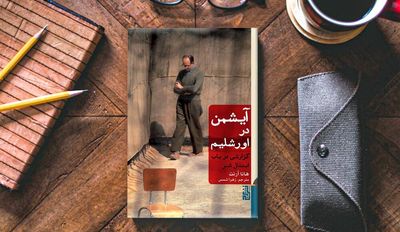A Persian translation of the book by Zahra Shams has recently been published by the Borj Publishing House in Tehran.
Critics Naeimeh Purmohammadi and Mahmud Moqaddasi and translator Shams will attend the session, which is scheduled to start at 11 pm on November 10 on Instagram/bookcitycc.
Originally appearing as a series of articles in The New Yorker, Arendt’s authoritative and stunning report on the trial of Nazi leader Adolf Eichmann sparked a flurry of debate upon its publication.
This book includes material that came to light after the trial, as well as Arendt’s postscript directly addressing the controversy that arose over her account.
A major journalistic triumph by an intellectual of singular influence, “Eichmann in Jerusalem” is as shocking as it is informative — an unflinching look at one of the most unsettling and unsettled issues of the twentieth century that remains hotly debated to this day.
Another Persian translation of “Eichmann in Jerusalem” by Aziz Hakimi has been published earlier by Nebesht Press in Tehran.
Arendt was one of the most influential political philosophers of the twentieth century. Born into a German-Jewish family, she was forced to leave Germany in 1933 and lived in Paris for the next eight years, working for a number of Jewish refugee organizations.
In 1941, she immigrated to the United States and soon became part of a lively intellectual circle in New York. She held a number of academic positions at various American universities until her death in 1975.
She is best known for two works that had a major impact both within and outside the academic community. The first, “The Origins of Totalitarianism”, published in 1951, was a study of the Nazi and Stalinist regimes that generated a wide-ranging debate on the nature and historical antecedents of the totalitarian phenomenon.
The second, “The Human Condition”, published in 1958, was an original philosophical study that investigated the fundamental categories of the vita activa (labor, work, action).
In addition to these two important works, Arendt published a number of influential essays on topics such as the nature of revolution, freedom, authority, tradition and the modern age.
At the time of her death in 1975, she had completed the first two volumes of her last major philosophical work, “The Life of the Mind”, which examined the three fundamental faculties of the vita contemplativa (thinking, willing, judging).
Source: Tehran Times

